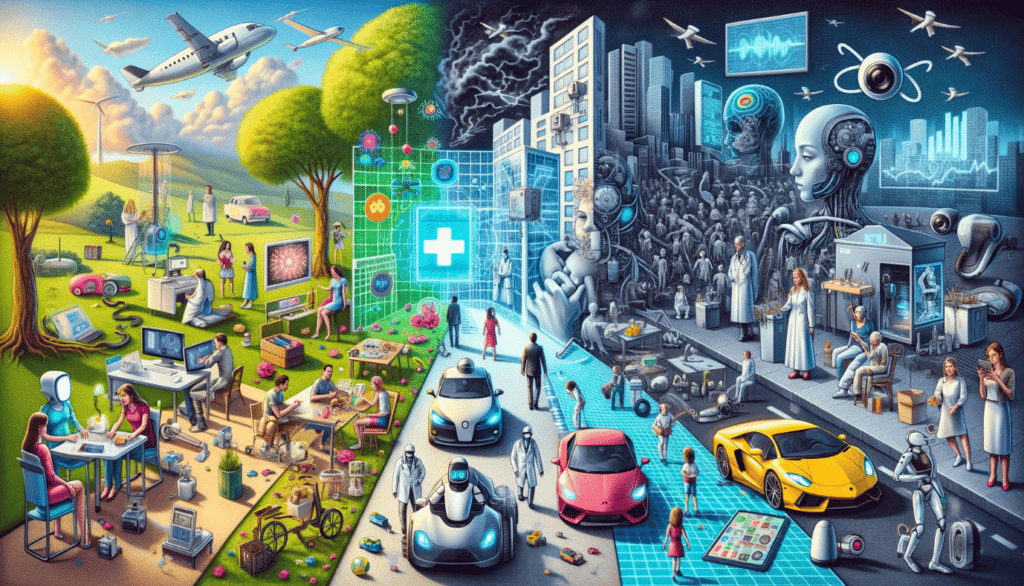As we navigate through the 21st century, the influence of Artificial Intelligence (AI) on our lives is becoming increasingly evident. AI is omnipresent, from personal assistants in our smartphones to complex algorithms determining global market trends.
But this begs the question: Is AI a boon or a bane?
AI has the potential to be a tremendous force for good. It can help solve some of our most challenging problems, improve our quality of life, and drive economic growth.
You may be interested to know about the sociological implications of AI and automation.
The transformative power of AI
AI’s capabilities are vast and varied, impacting numerous sectors.
In healthcare, AI algorithms assist in diagnosing diseases with accuracy, surpassing human doctors in some cases. Tools like IBM Watson have been instrumental in oncology, analyzing medical data to suggest personalized treatment plans for cancer patients.
In the education sector, where each student has their own way of learning and their own pace, is that right? Some are visual learners, some prefer reading, and others learn best by doing. AI can personalize education to fit each student’s style. It’s like having a personal tutor who knows how you learn best.
And the coolest part? This kind of AI-assisted learning could be available to everyone, everywhere. It doesn’t matter if you’re in a big city or a small village – as long as you have access to a computer or a smartphone, you can have this personalized learning experience.
In the realm of environmental conservation, AI is a game-changer. Algorithms analyze climate data to predict and mitigate natural disasters. AI-driven projects monitor wildlife and their habitats, offering insights into conservation strategies.
The transportation sector has been revolutionized with the advent of self-driving cars. Companies like Tesla are at the forefront, using AI to enhance safety and efficiency, potentially reducing accidents caused by human error.
How does AI influence in everyday life?
Think about how AI has quietly sneaked into our daily routines. You know Siri and Alexa, right? They’re like those helpful digital buddies in our homes. Just by saying “Hey Siri” or “Alexa,” you can get them to do a bunch of stuff – play music, set reminders, even tell you the weather. It’s like having a personal assistant always ready to help; all you have to do is ask.
Now, let’s talk about Netflix. Have you ever noticed how it seems to know what you want to watch? That’s AI at work, too! Netflix uses AI to monitor what you watch and how you watch it. It’s pretty clever – it looks at your viewing habits and suggests other shows and movies you might like. So, when you see that “Because you watched…” section, AI gives you a nudge towards your next binge-watch. It’s like having a friend who knows your taste in movies and TV shows so well that they always have excellent recommendations for you. Cool, right? This kind of thing changes how we pick what to watch, making it personalized.
The economic impact
Economically, AI is a powerhouse. It’s predicted to add trillions to the global economy in the coming decade.
So, why is AI such a big deal economically? The main reason is automation. AI-driven automation is like putting things on autopilot but in a super bright way. It can do tasks faster and more accurately than humans in many cases. This means businesses can get more work done in less time, which is great for their bottom line.
For example, imagine a factory that makes cars. With AI, the factory can automate a lot of the manufacturing process. Robots and computers handle repetitive, precise tasks, and they don’t get tired or make mistakes like humans can. This speeds up the whole production line and reduces the chances of errors, which can be costly.
Here are the ways to prepare for the future of work.
But it’s not just about making things faster and cheaper. AI also helps businesses offer better services.

But at what cost?
In the dazzling artificial intelligence (AI) world, getting caught up in the excitement of progress and innovation is easy. But, as with any transformative technology, there’s another side to the coin that we need to talk about.
First up is job displacement. It’s a big worry. As AI gets smarter and more capable, it can do jobs that humans used to do, especially in fields like manufacturing and customer service. Think about factories automating their production lines with robots or companies using chatbots instead of people for customer support. This can lead to people losing their jobs, which is a genuine concern. The challenge is figuring out how to ensure these technological advances don’t leave people behind.
You may like to know more about impact of AI on job recruitment.
Then there’s the whole ethical side of AI, which is super complex. Privacy is a huge issue. As AI systems collect and analyse more and more data, there’s a risk of that information being misused. This could mean an invasion of privacy, like companies knowing too much about your personal life or governments using AI for surveillance in ways that feel like they’re straight out of a dystopian novel.
Another part of the ethical puzzle is how AI might perpetuate biases. Here’s the thing: AI systems learn from data, and if that data has biases – which, let’s face it, a lot of human-generated data does – then the AI will learn those biases, too. This can lead to unfair, discriminatory practices, like an AI system used for hiring or lending money being biased against certain groups of people.
So, while AI brings some fantastic advancements, it’s not without challenges. It’s like we’re opening Pandora’s box, and we must be careful about managing what comes out of it. The key will be finding ways to harness AI’s benefits while addressing these genuine concerns.
AI boon or bane: Striking a balance
To ensure AI is a boon rather than a bane, it’s essential to focus on ethical development and deployment, i.e., adhering to clear guidelines and regulations to safeguard against potential harms like privacy invasion and biases. Investing in AI literacy is also crucial, as is educating people across all levels of society about AI’s capabilities and implications. Transparency is critical as well. AI systems must be understandable and accountable, especially when their decisions significantly impact people’s lives. In essence, harnessing the benefits of AI while responsibly managing its challenges requires a balanced approach, blending innovation with ethical considerations, education, and transparent regulatory frameworks.
You may be interested to know how AI enhances job opportunities and jobs created by the advent of AI.
Conclusion: A cautious embrace
AI, undoubtedly, is a powerful tool that has the potential to reshape our world. But as with any powerful tool, AI can be a boon, a transformative force for good, if managed responsibly. Alternatively, it can become a bane if its development and deployment are unchecked. The future of AI is in our hands, and it’s up to us to steer this powerful tool towards a future that benefits all of humanity. As we embrace the AI revolution, let’s do so with caution and optimism, ready to harness its power while prepared to address its challenges head-on.
Prepare for your next career milestone with us












